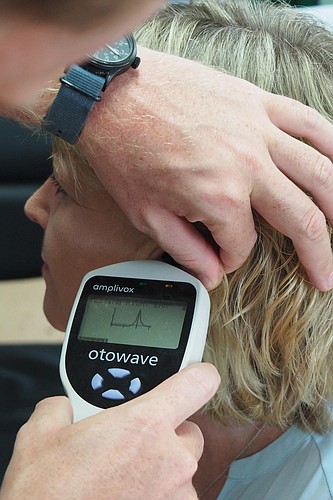- April 9, 2025
Your free article limit has been reached this month.
Subscribe now for unlimited digital access to our award-winning local news.

We have patients every day in our hearing center that contact us because they think they need hearing aids. The reality is that what they are actually searching for is better hearing, and they hope that a hearing aid will provide exactly that. The not-so-simple answer is that hearing aids may or may not be the answer to their troubles. Hearing and understanding (specifically speech) is a complex and marvelous function of the human body, and it involves not only your ears but also your brain. In fact, the brain is the most important part of the mechanism in human hearing.
Most places that advertise hearing services or hearing aids focus on just that- the hearing aid. Whether you are considering an over the counter (OTC) hearing aid or a prescription hearing aid, it is important that you realize that the hearing aid is only one small part of improving your hearing. Most hearing aid offices focus on a simple hearing test and then go straight to the hearing aid recommendation. At Palm Coast and Ormond Hearing Centers, we focus on the total hearing system, from the ear to the brain, and including other aspects like your vision, tactile ability, and cognitive processing ability. As a Doctor of Audiology, my primary goal is to medically evaluate you to get a complete picture of your auditory abilities. In addition to tone testing, we also test the outer hair cells of the cochlea (the little snail shaped organ of hearing deep inside your ear that connects to the auditory nerve, leading to the brain), the eardrum (to make sure there are no tears or damage, or fluid build-up like an ear infection), and words and sentences, in both quiet and noisy environments. We incorporate cognitive screenings and functional testing on your fine motor skills. The cognitive aspect of our evaluation is to look at how your brain processes the sounds that the ear is sending. For example, I see many patients in my practice who have little to no hearing loss yet still struggle understanding speech, especially in environments where there are competing noises (the tv in the background, the water running in the kitchen, or talkers sitting at a table behind you in a restaurant). These patients may not have a hearing problem, they have a PROCESSING problem. A hearing aid may help, but it will not solve their “understanding” problems. As audiologists we are the only specialists qualified to diagnose and treat auditory processing conditions. This can mean the accurate fitting of a prescription hearing device, but many times that is not the treatment that is appropriate. There are different types of auditory training therapy and complementary devices available that are much more effective for treatment. The additional components of a thorough evaluation include vision and fine motor skills to assess which devices or therapies will be appropriate. An example is a 52-year-old patient that has complaints that when she is in a restaurant with her husband, she could not understand anything he was saying- the noise was so loud and distracting, even though she could HEAR him, she could not understand him. However, when they were at home eating dinner together, she had no issues. Her evaluation revealed that she had a very mild hearing loss but a moderate auditory processing deficit, and mild neuropathy in her hands. She also had vision loss corrected by glasses. Her treatment plan included prescription hearing aids that were programmed to reduce noise and emphasize speech that she needed to wear only in noisy situations- they were easy to adjust via an app on her phone so she didn’t have to worry about tiny buttons to push, and 12 weeks of auditory training therapy which she was able to complete at home while receiving follow-up visits with me every 4 weeks to make sure she was on track. Her auditory processing skills improved significantly and at post-therapy testing her processing scores have improved to a normal level.
Sadly, if this patient had gone to a hearing aid store to get a “free” hearing test, she would have been told her hearing loss was too minimal for hearing aids and sent on her way. She would have continued to struggle, and her processing skills would have continued to worsen over time.
As audiologists, we see patients every day that have a variety of hearing complaints, that can range anywhere from a wax impaction (we remove wax and make sure that your ear canals are healthy), “stuffed-up ears”, difficulty hearing in noise, difficulty understanding speech from fast speakers, ringing in the ears (tinnitus), and difficulty hearing soft sounds. We are here to help you understand the source of your hearing difficulties and get you back on the road to great hearing, so you can enjoy your life!
At Palm Coast and Ormond Hearing Centers, our mission is to provide the best quality hearing care possible, educate the community and help all patients make informed decisions so they can get the care they need and deserve. Want to learn more about hearing health? Visit our website at palmcoasthearingcenter.com and click the “About” button, then “Helpful Articles”. You can also schedule an appointment online. We also have a second location to serve you in Ormond Beach at ormondhearingcenter.com, or you can call us at 386-283-4932.
Your free article limit has been reached this month.
Subscribe now for unlimited digital access to our award-winning local news.